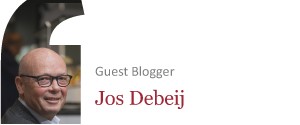Guest Blogger: Jos Debeij, head of staff department library system, Koninklijke Bibliotheek (Royal Library), National Library of the Netherlands.
In the month of November, a dozen library bloggers outline an image of what is taking place in the system of the Dutch public libraries. In the Netherlands as well, the past years have seen considerable cutbacks in budgets of public libraries as a result of the economic recession, the formation size has been reduced substantially and quite a few larger independent branches in neighbourhoods and towns have been closed or converted to smaller service points in schools and townhouses. It sounds contradictory, but at the same time many new library buildings are being built. There too, a large change is visible. The issues are simultaneously to economize, consolidate and renew, but to do so with less money and fewer professionals.
Another trend is the library more and more focussing on social issues and personal development. The library, rather than a ‘repository of books’, is becoming a place for meeting and working. The amount of lends has decreased significantly over the past twenty years. New activities are being taken up. Following the tradition of reading advancement, all Dutch public libraries put a lot of effort in language development and digital skills. The approach is twofold: 1. Preventive, in cooperation with intervention programmes from the National Reading Association, such as Bookstart, the Library in school and the ReadAloudExpress , to reach children from a young age and bring their language development to a higher level, and 2. Curative, with the library as a language house where anyone who has functionally insufficient language skills or digital skills is welcome to attend language cafes, workshops and schooling programmes or other support. In this, the libraries cooperate with numerous local education and social partners and with large groups of citizens, such as voluntary trainers and ‘buddies’. With the Dutch Tax Authority agreements have been made to support all libraries with the electronic filing of the digital revenue form or the digital request for grants. The renewed vision on media wisdom (link to English version) elaborates on 21st century capacities: the role of the library as signpost and workplace is being expanded: the library as knowledge workplace and as makerspace.
With the new Library Act (WSOB) the National Library of the Netherlands has gained a new function and adjusted its policy accordingly, and the position of the provincial support has been consolidated with focus on the innovation at local libraries. At the National Library, we continue building the national digital public library. With digital collections and services that are available to every person in the Netherlands and are part of the digital infrastructure for all members of the local libraries. The local public library and the national digital library complement each other and are connected. In searching for the public library of the future the Dutch libraries are working closely together. With a collective innovation agenda, with an exploration of the VOB called Route 2020 (see blog Henriëtte de Kok), with the knowledge sharing platform Biebtobieb (see blog Levien den Boer), with the marketing campaign The Library Enriches You (see blog Coen van Hoogdalem) and with a collective quality framework for audits and certification (see blog Willem Camphuis).
The world is changing, and so are public libraries. In the Netherlands as well, public libraries are busily working on their future. To continue bringing people and information together. In this way, libraries continue to contribute to the personal development of the Dutch people and a smarter and more creative Netherlands.

